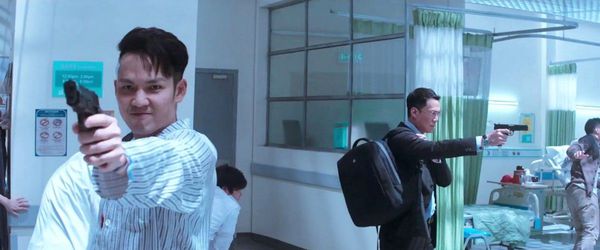Eye For Film >> Movies >> Three (2016) Film Review
Three
Reviewed by: Jennie Kermode

A gang boss willing to do anything to avoid prison. A police detective determined to bring down his criminal enterprise. A young neurosurgeon learning brutal lessons about her own fallibility. These are the three characters at the heart of Johnnie To's latest tale, their agendas colliding in a hospital ward.
Shun (Wallace Chung) is not your average thug. Finding himself cornered in a stand-off with the police, he has shot himself in the head to ensure that he'll be taken to hospital and have a chance to escape, but for that to happen he has to avoid actually having surgery, and he uses his extensive knowledge of the law to keep the doctors at bay as he tries to frame a police officer for the shooting and arrange his escape. Chief Inspector Ken (Louis Koo) knows roughly what he's plotting but bides his time in the hope of being able to capture the whole gang. Meanwhile Dr Tong (Wei Zhao) becomes increasingly anxious about the need to get Shun into surgery so she can remove foreign matter from his brain and stop his seizures, as well as becoming frustrated at the usurpation of her authority by police officers who seem happy to ride roughshod over the law.

It's Tong's journey that forms the emotional centre of the film. She's still at that bright eyed and endlessly hard-working stage young doctors go through before they have understood the principle of triage and realised that people will die no matter what they do, and that if they exhaust themselves then their own errors will kill people. To's fondness for quirky, humorous and tragic incidental characters manifests as he introduces us to various other patients on her ward, reminding us that they are all going through personal experiences as dramatic as anything in Shun's life. Tong is trying to be there for all of them, but it's clear at the outset that she's already in desperate need of sleep. For all the ugliness of the events that will unfold around her when Shun's escape begins, there's a sense that they may bring her closer to sanity, providing a short cut on a journey she would always have to make sooner or later.
By contrast, the two male leads feel underdeveloped, in part because they're relying heavily on established tropes. Koo is constrained by his character's professionalism (dubious though Ken's approach to the job sometimes is) and has limited opportunity to show emotion, but as the film develops we glimpse flashes of desperation which hint at the turmoil beneath the surface. Chung gives Shun a sociopathic quality; the gangster takes pleasure in facilitating mischief or outwitting others, but seems to feel little else beyond the will to survive. We learn nothing about his background. Instead we are focused, as he is, on the here and now, in which every detail could be part of some devastating scheme, from befriending the man in the next bed to whistling the third movement of Boccherini's String Quartet in E Major.
Boccherini sets the tone for the balletic structure often present in To's work. The hospital provides the perfect context for the bright, clean interiors the director loves, with everything photographed so starkly as to create a sense of simplicity and openness in a story where, in fact, everybody has secrets. Every movement is beautifully choreographed leading up to and into the inevitable gun battle, so that characters seem predestined to end up where they do. Tong doesn't believe in luck, but her supervisor tries to persuade her that things will happen as they happen, no matter what she does.
This isn't To's strongest work. The unnecessarily convoluted plot undermines the tension inherent in the gradual implementation of the escape plan. A good 20 minutes could be cut out of the earlier part of the film without losing much of value. it's beautifully shot throughout, however. Zhao works well in her role and once the action starts, fans of the director's earlier gangland films will get what they hoped for. It's an interesting entry in the catalogue of films through which To is aiming to explore deeper themes, and as such, may come to have historical value. It is, as they say, better than a hole in the head.
Reviewed on: 04 Mar 2017















